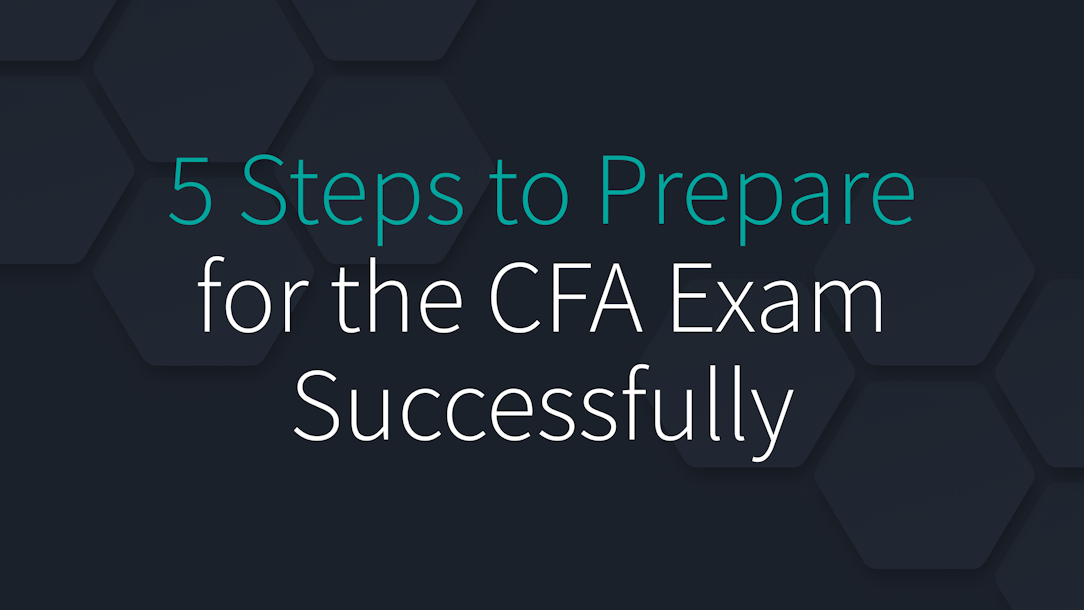
5 Steps to Prepare for the CFA Exam Successfully
Successfully passing the CFA exam is a journey that requires more than just hard work—it requires strategy, discipline, and the right mindset.
The CFA exam is known for its rigor and the significant commitment it demands from aspiring financial professionals. With a pass rate that hovers around 40%, successful preparation requires more than just memorization—it requires strategy, discipline, and the right resources.
Whether you are preparing for Level 1, 2, or 3, following a structured approach can significantly enhance your chances of passing. Here’s a 5-step guide to ensure your CFA exam preparation is both effective and efficient.
Step 1: Understand the CFA Exam Format and Content
Before diving into your study materials, take the time to understand what you're up against. The CFA exam consists of three levels, each progressively more complex.
- Level 1 focuses on the basics of financial analysis, covering topics like quantitative methods, financial reporting, and ethics.
- Level 2 builds on these concepts and emphasizes applying them to real-world scenarios through item sets.
- Level 3 focuses on portfolio management and requires you to synthesize knowledge across all topics, with an emphasis on practical application.
Understanding the exam format, question types, and weightings for each section helps you to approach your study plan with a clear direction. It also ensures that you spend time on high-impact areas that could maximize your score.
Step 2: Create a Detailed Study Plan
A detailed study plan is the backbone of CFA exam success. Start by determining how much time you have before your exam and allocate your hours wisely across the various topics.
A general recommendation is to aim for around 300 hours of study per level, but how you distribute that time is crucial. Some subjects, like Financial Reporting & Analysis, carry more weight, so adjust your schedule accordingly. Consider the following tips when building your plan:
- Prioritize based on topic weight—spend more time on high-weight subjects like Ethics and Equity Investments.
- Set realistic daily and weekly goals to track your progress.
- Incorporate review sessions to regularly revisit material and prevent information from slipping away.
- Be flexible, allowing room for unforeseen disruptions, but ensure you remain on course.
Step 3: Leverage CFA Study Resources
Not all study materials are created equal. The CFA Institute provides the official curriculum, but supplementing this with other trusted resources can give you an edge.
- Third-party materials: Popular options like Kaplan Schweser, Salt Solutions, and Wiley offer condensed study guides, practice exams, and topic-specific quizzes to make reviewing more manageable.
- Mock exams: Indispensable for simulating exam-day conditions and identifying areas needing extra practice.
- Video lectures: Great for breaking down complex topics and presenting information in a more digestible format.
At Salt Solutions, we provide a range of tailored CFA prep resources, including interactive quizzes, video lectures, and practice exams to keep your learning dynamic and effective.
Step 4: Focus on Key CFA Exam Strategies
It’s not enough to simply learn the content—you need to approach the exam with strategy. CFA exams are notoriously time-pressured, so knowing how to manage your time and maximize your score is crucial.
- Prioritize high-weight topics: Focus on core areas like Financial Reporting & Analysis, Equity, and Ethics instead of spending too much time on minor topics.
- Practice time management: Use practice exams to simulate timed conditions and develop a rhythm for working through questions efficiently.
- Apply active learning techniques: Use practice problems, concept maps, and flashcards to engage with the material and improve retention.
Step 5: Take Care of Your Mental and Physical Well-Being
One often overlooked component of exam preparation is self-care. Studying for the CFA exam is mentally taxing, and maintaining your health can directly impact your performance.
- Stay active: Incorporate regular exercise into your routine to reduce stress and keep your energy levels high.
- Get enough rest: Avoid late-night cramming—prioritize sleep to improve memory retention and focus.
- Manage stress: Use relaxation techniques like meditation or deep breathing to keep anxiety in check as exam day approaches.
A well-rounded approach to preparation means staying mentally sharp and physically healthy. Burnout is real, so take time for yourself when needed.
Conclusion
Successfully passing the CFA exam is a journey that requires more than just hard work—it requires strategy, discipline, and the right mindset. By understanding the exam structure, creating a comprehensive study plan, using high-quality resources, and taking care of your mental and physical well-being, you’ll be well on your way to success.
At Salt Solutions, we’re dedicated to helping you excel in your CFA journey. Our CFA Exam Study Material Guide & Notes offer an organized approach to tackling the curriculum. For those just starting, check out our tailored prep for Level 1.
If you're preparing for Level 2 or the final Level 3, we’ve got you covered with video lectures, quizzes, and expert guidance designed to help you succeed. Let us be a part of your CFA success story!